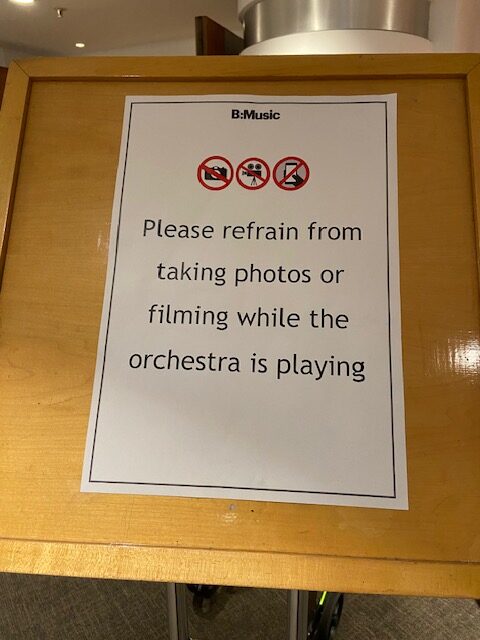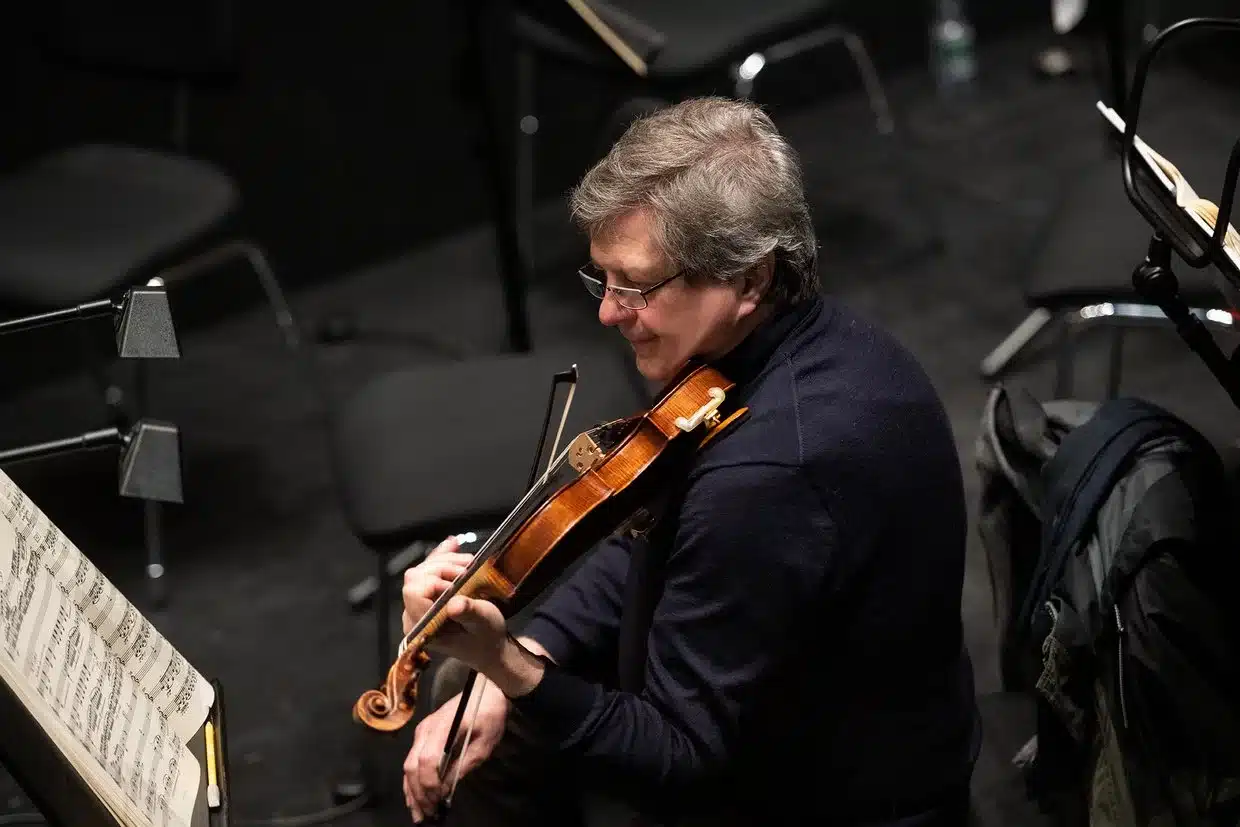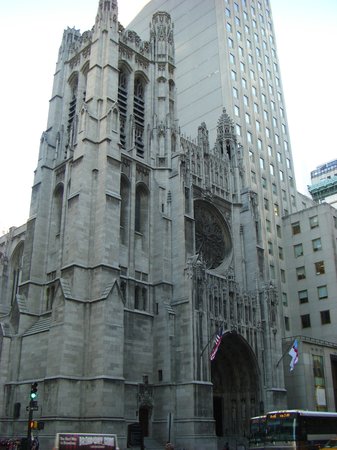What do Hollywood composers do between takes?
mainThey write chamber music. Some quite well. See here.

They write chamber music. Some quite well. See here.

The following notice has gone up in Symphony…

The orchestra is bidding farewell to Alessandro Cappone,…

The incoming music director of the New York…

The cornerstone Anglican church is offloading its choir…

Session expired
Please log in again. The login page will open in a new tab. After logging in you can close it and return to this page.
Rózsa was a very talented composer, just as Bernard Herrmann was.
There were (or are) composers who worked in Hollywood that were gifted but they were never recognized outside the movie business.
The other day I heard a fantastic piece by Jerry Goldsmith titled “Music for Orchestra”, an uncompromising piece that very much suggests the music of old mavericks like Carl Ruggles or Edgard Varese.
Rozsa was a serious composer who was on the faculty at Univ of Southern California for 20 years. He composed nineteen works — with opus numbers — in the chamber music genre. Heifetz, Piatigorsky and Lateiner recorded a chamber version of his Tema con Variazione for RCA. He wrote concertos for Heifetz, Janos Starker and Leonard Pennario, so I don’t think anyone need be surprised that he had composed an extensive catalog of music for the concert stage.
Actually, I think Rozsa might have thought it was the other way around: that he wrote film music between writing concert music. He always said he led a ‘double life’ (the title of his autobiography). Indeed, his first successes were concert pieces.
Interesting. Does the quartet have its own website somewhere?
And let’s not forget Erich Wolfgang Korngold–or, for that matter, John Williams!
Regarding the review, Rózsa won his second Oscar for scoring the Ronald Colman film “A Double Life” (rather than “The Killers”). He would receive a third, of course, for “Ben-Hur.” Thanks all the same for shining a light on this fine composer.
…..”never recognized outside the movie business”? Hardly.
Both Rozsa and Herrmann had many symphonic works played by our great American orchestras. As a matter of fact, in 1943 a program constructed by Bruno Walter for the New York Philharmonic included a Rozsa work.
As matters turned out Walter fell ill and was unable to conduct the Sunday matinee performance. It fell to the Philharmonic’s Assistant Conductor to take over——without rehearsal!
In those years the Sunday afternoon Philharmonic concerts were broadcast nationwide on the CBS Radio Network, That incident made front page news in The New York Times the next day, and the Assistant Conductor was shot to instant fame. His name was Leonard Bernstein.
Atta boy! Go get ’em Marty. So glad to know you are still very much in the middle of things. Miss you. Ed and June Alley
Thanks Ed and June. Miss you, too!
He didn’t say Rósza and Herrmann were not recognized outside the movie business.
Just glad to see Martin Bookspan here.
Miss your old Saturday night show here in Boston.
I keep trying to simulate “Great Square Inches of Art” at parties here and always fail miserably.
Is it available anywhere?
Hi, James,
And I’m glad to hear from you!. But I wonder if you’re confusing me with my longtime friend, the late Richard L. Kaye. I left Boston in 1956 (after 9 years of broadcasting in my hometown) for New York, which I’ve made my headquarters ever since. Richard, also a native Bostonian, remained there and almost single-handedly made WCRB the GREAT station that it formerly was.
Richard used to have a post-Boston Symphony broadcast every Saturday evening that he called “The Comedy Show”. I know he used to import piles of LPs from England, and I suspect that “the greatest square inch of art” originated there.
All best,
M.B.
I’ve always wondered what Korngold might have done if he had not been forced to immigrate and work in Hollywood. Great things judging by the influences you can hear in his serious works, especially the early pieces.
‘Might have done’? Given that he’d already written one of the finest 20th century operas and a superb body of chamber music long before he came to the USA, some would say that producing the most-performed postwar Violin Concerto (currently the single most-played work in the Schott catalogue) and the most successful post-Mahler Austrian symphony wasn’t bad going…
Yeah, and all those SHARPS!! (He had a whole quiver full.)
André Previn — a rich recent body of chamber music, two operas, strong filmscores, several wives, a gift for jazz, an effective conductor, and quite a comedian!
His memoirs of MGM, ‘No Minor Chords’ is essential reading. I bumped into him and Mia Farrow at the RFH back in the ’70’s following an Ashkenazy recital. Starstruck teenager that I was, I asked him the most stupid question imaginable:
Me: What’s it like being André Previn?
AP: Don’t know. What’s it like being you?
Me: (Looking at Mia Farrow) Not as interesting as being André Previn.
He still signed my programme. Ashkenazy was always a true gent, even more so when I told him he used to live next door to my mother in North London. Great years, those teenage years…
My guess is that he will be remembered as a composer, after all.
Miklos Rosza wrote a very fine work for solo clarinet I performed in my young years-I believe it was a sonata-but in any case it made me realize what a fine composer he was! I’ve also enjoyed listening to Martin Bookspan-glad he is still around.
Thanks, Raymond,
I’m a little worn for wear, but definitely still around!
Just want to say you are far too modest; you must be/have been a pretty terrific clarinetist; Rosza’s sonata for solo clarinet is one of the hardest pieces I ever encountered, and despite being pretty proficient on the instrument, never managed to master to the point that I felt up to performing it. I agree it’s a terrific work. Also a huge fan of his violin concerto, which IMHO is scandalously underplayed.
I wish more film composers would write for the stage and concert hall and give us a break from the onanistic crap we often have to endure from so-called legitimate, serious composers.
And then there were all the ‘serious’ composers who made a living toiling away largely uncredited in movie studio music departments: Alexander Tansman, Ernst Toch, Mario Castelnuovo -Tedesco…. or more recently (and largely credited),Tom Pasatieri….
No confusion. You just keep going!
Yes, I don’t know where Mr. Lebrecht gets the idea that Miklos Rosza was primarily a film composer; he wrote lots of “serious” works and they have lots of recordings. Don’t any of them make it over to the UK for him to review?
Just came across this thread and wanted to thank you all for your perceptive comments about Erich Wolfgang Korngold.